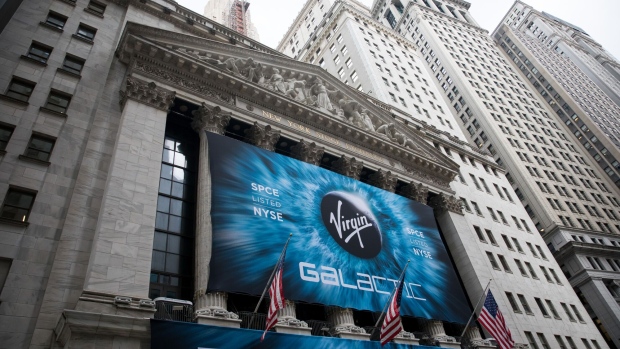Feb 27, 2024
Virgin Galactic Revenue Misses Estimates, Will Focus on Delta Ships
, Bloomberg News

(Bloomberg) -- Virgin Galactic Holdings Inc. fourth-quarter revenue fell short of Wall Street expectations as the space tourism company works to rein in costs and slow its launch schedule while developing a new spaceplane.
Revenue in the period was $2.81 million according to a statement Tuesday, below the $2.98 million in analyst estimates compiled by Bloomberg. Sales were driven by commercial spaceflight operations and membership fees from future astronauts.
The company lost 26 cents a share in the fourth quarter on an adjusted basis, better than the 32-cent deficit in analysts expected.
Full year revenue of $6.8 million was below the $7 million Wall Street expected. Revenue for the first quarter of 2024 is expected to be some $2 million, the company said.
The firm said it would be “completing the build-out of our spaceship factory,” assembling its Delta ships and focusing on long-term growth.
Virgin Galactic fell 6.8% at 5:38 p.m. in New York in after-hours trading.
The results highlight Virgin’s slow-but-steady path to establishing a routine cadence of spaceflights for paying customers. The Richard Branson-founded company has sent six missions to the edge of space since it began commercial operations in the middle of last year.
The company said it planned to pause flights in the latter portion of this year to keep costs under control while it develops its next-generation Delta spaceplane. The vehicle will be optimized for reusability and quick turnaround times between flights, the company has said. It plans to enter them into operation starting in 2026. Virgin Galactic revealed the plans in November as it cut about 185 jobs.
Virgin said its new Delta spaceship factory in Arizona is on track to open in mid-2024. The facility will be capable of producing as many as six spaceships per year, the company has said.
Virgin Galactic said it increased its pricing to $600,000 per seat on its tourism flights, up from $450,000, and inline with its current pricing for research flights.
Virgin Galactic believes it can eventually generate some $1.1 billion to $1.4 billion in revenue at its spaceport annually, if it can run 300 to 400 flights per year, the company’s Chief Financial Officer Doug Ahrens told analysts.
Earlier this month, Virgin Galactic suffered a setback when it revealed that a pin used to align its VSS Unity spaceplane and the VMS Eve carrier aircraft detached during a crewed mission in January.
Virgin Galactic executives told analysts the company was improving the design of the retention mechanism that keeps the pin in place and continues to work with the Federal Aviation Administration on an incident investigation.
Its next commercial spaceflight remained on track for the second quarter of 2024, the company said.
(Updates with details on factory, ticket prices from ninth paragraph.)
©2024 Bloomberg L.P.


